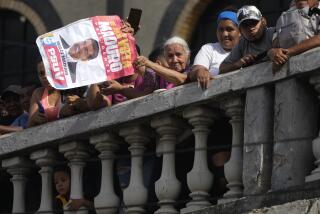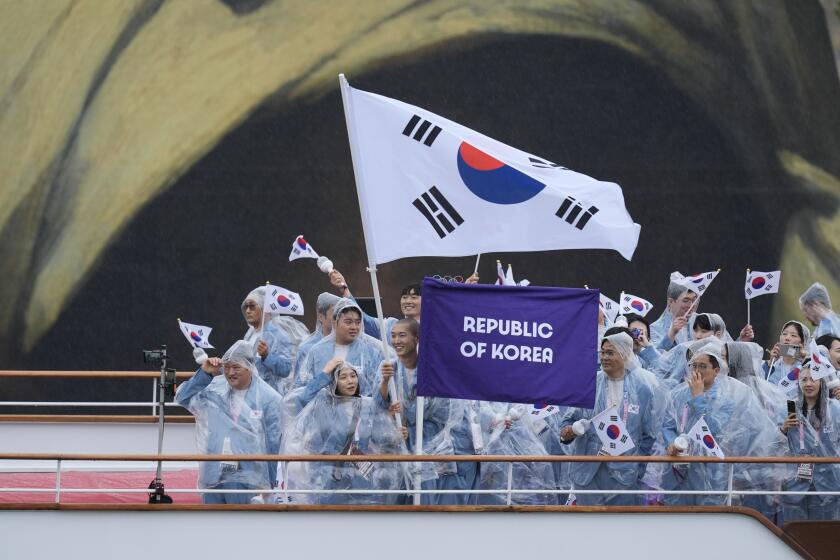Gates Expected to Push for Rush Job on CIA Overhaul : Intelligence: Agency’s new chief has said changes must come quickly. Some question if he is right for job.
A new day has arrived at the Central Intelligence Agency, and it begins before dawn.
As Robert M. Gates takes the helm after a bitter confirmation battle, crews who clean his seventh-floor suite of offices at the agency’s Langley, Va., headquarters have been told to finish their work early because the new boss often arrives before sunrise.
And the analysts who compile the overnight cable traffic for Gates to read on his way to the office in his government limousine will be speeding up their work as well.
In a ceremony at the CIA’s auditorium, Gates will be officially sworn in today by Supreme Court Justice Sandra Day O’Connor. President Bush will attend and deliver remarks, officials said.
Some had expected Gates to ease into his new position after the bruising confirmation ordeal. After all, the CIA faces the delicate task of virtually reinventing itself and its mission now that the Cold War has ended.
And serious questions have been raised about whether Gates, with his long record as a hard-liner and a sometimes-abrasive administrator, is the right man for these times.
But whatever else, this will not be a slow and gentle start.
There will be no pause for old wounds to heal while Gates, a 25-year veteran of the agency who is returning after three years at the White House, learns his way around. From all indications, the pace of change will accelerate after months of uncertainty over Gates’ nomination, as the agency enters a period of ferment unprecedented in its 44-year history.
He said in his confirmation hearings that change in the U.S. intelligence community was inevitable and that “it must come and come quickly.” He said that one of his first acts as director would be to convene a blue-ribbon panel to review U.S intelligence needs for the next 15 years.
He said that the agency must speed up its collection of intelligence and get the product to decision-makers more quickly. He also said that the CIA would produce fewer but better reports reflecting a range of views, including those of outsiders.
But what remains unclear is how Gates will seek to achieve those changes while working with a sprawling, secretive bureaucracy that is rich in talent but riven by suspicion and uneasiness about Gates himself.
In past tours of duty at the agency, the new director of central intelligence sought to bulldoze the skeptics with blistering criticism of those whose performance he thought fell short. When he assumed the leadership of the agency’s corps of 2,000 analysts in 1982 as head of the CIA’s directorate of intelligence, he delivered a scathing attack on what he called the group’s intellectual laziness and the irrelevance of its analysis to policy-makers.
Veterans who recalled that performance said that they do not expect Gates to return to the agency with a whip, but neither do they anticipate an olive branch. It’s not in his nature, they said.
“I think he’ll address the morale issue. He has to,” said one Administration official who left the agency in the mid-1980s, in part because of differences with Gates. “I expect him to take on the fact that we have to get on to alternate ways to look at things and protect dissent. People will be listening for him to say that from now on ideas will be allowed to percolate up from the bottom, rather than being dictated from the top. If he can find language to do that, that sends the right signal.”
But, this former CIA analyst said, “this is a very brittle bureaucracy. Every little change causes a neuralgic response, a certain overreaction. He’s not very comfortable with people, and he inspires acrimony that he doesn’t even understand.”
Anthony Cordesman, the national security adviser to Sen. John McCain (R-Ariz.) and a former senior intelligence official at the Pentagon, defended Gates, saying that frictions and competition within parts of the CIA and among the government’s various intelligence organs are healthy and will never be eliminated.
“The key problem facing Gates is not the frictions that exist today but the need to convert the agency from one whose focus is the Cold War . . . to a world in which north-south conflicts and global economic competition become the key focus of intelligence,” Cordesman said. “That means basically restructuring large elements of the agency. It also means gradually establishing a fundamentally new relationship with the consumer.”
But reassuring and restructuring the agency’s analytic arm is only part of the challenge facing Gates. As director of central intelligence, he oversees not only the CIA with its roughly 16,000 employees but the vast $30-billion-a-year intelligence apparatus of the entire government.
That includes the National Security Agency, which is responsible for electronic intelligence gathering; the Defense Intelligence Agency, the Pentagon’s analytic arm; the National Reconnaissance Office, which operates spy satellites; the State Department’s Bureau of Intelligence and Research and a number of smaller operations scattered throughout the government.
And while the controversies debated during Gates’ confirmation hearings centered on the CIA’s intelligence directorate, the agency also encompasses an array of bureaus dealing with scientific and technical intelligence and an operations directorate, which runs the CIA’s corps of spies and its covert actions overseas.
Gates said that, for political and budgetary reasons, the CIA will be doing significantly less covert action around the world. But he said that he plans to increase the surreptitious collection of data abroad by hiring more spies.
“We must dramatically expand our clandestine human intelligence collection effort,” Gates said during his confirmation hearings.
But “humint,” as human intelligence is known in the spy trade, has its limits, specialists said.
One Capitol Hill staffer who works on intelligence issues said that “the notion that humint is going to unlock the secrets of human history is vain. As a practical matter, most of what goes on in the world that motivates and constrains the strategic behavior of states is not detectable through the tools of espionage. It requires a sensitivity to and recognition of facts that are readily accessible.”
The CIA’s New Mission
Critical challenges confronting the Central Intelligence Agency:
* Redefining U.S. intelligence needs after the collapse of communism.
* Reorganizing the U.S. intelligence complex to respond to current threats.
* Tracking the proliferation of nuclear, biological and chemical weapons.
* Adjusting to lower military and intelligence-collection budgets.
* Gathering up-to-date economic intelligence on U.S. trading partners and rivals.
* Restoring morale following charges of slanting of intelligence analysis.
* Assessing the political and military future of states of the former Soviet Union.
* Monitoring global traffic in drugs.
More to Read
Sign up for Essential California
The most important California stories and recommendations in your inbox every morning.
You may occasionally receive promotional content from the Los Angeles Times.






